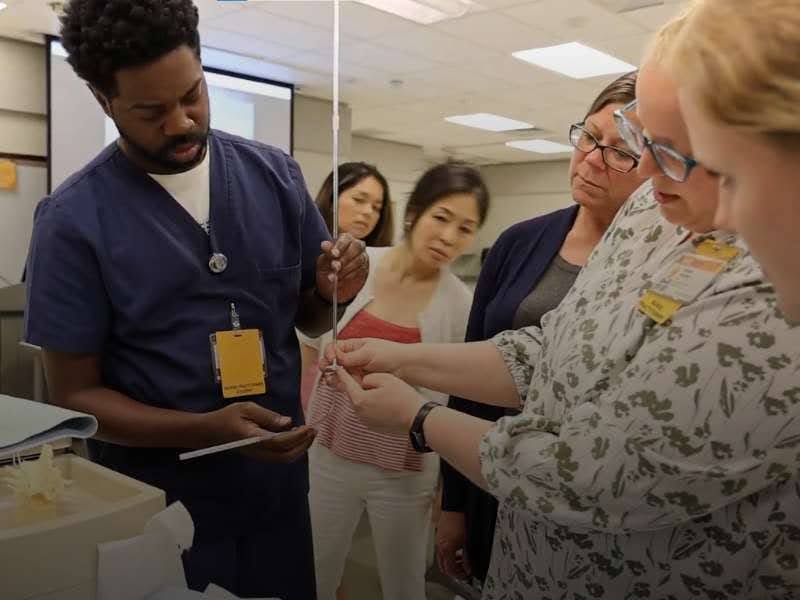D.N.P. capstone projects help nurses advance their practice with purpose
September 2, 2025

The Doctor of Nursing Practice (D.N.P.) program at the VCU School of Nursing equips nurses to lead meaningful change in today’s complex health care systems. D.N.P. projects are grounded in real-world challenges and focus on applying evidence to improve care delivery, expand access and strengthen systems of care. Through quality improvement, implementation science and policy initiatives, students design and lead projects that create direct, lasting impact for patients, providers and communities while positioning them to continue driving meaningful change throughout their careers. These projects serve as the capstone of the D.N.P. program, bringing together each student’s advanced clinical knowledge, leadership skills and commitment to translating evidence into action.
Presented by students graduating this spring, this year’s projects highlight the breadth and depth of D.N.P. scholarship. Working across inpatient and outpatient settings, from intensive care units to rural wellness clinics, students addressed critical issues including clinical standardization, patient safety, mental health access and organizational culture. Each project reflects rigorous scholarly work and a strong commitment to patient-centered care, with students collaborating closely with VCU Health and other health care systems to implement meaningful change.
“Through their work they served as a project manager with the goal to move an identified issue of concern to a team-developed and trialed solution,” said Debra P. Shockey, D.N.P., RN, CPNP-PC, program director for graduate practice programs. “These small tests of change lead to improvements in work-based issues that enhance the patient and staff experience, while teaching students that change is hard and requires all the right players at the table. The experience strengthens their skill set and proves mutually beneficial to our health care partners.”
Over four days of presentations, 48 D.N.P. students demonstrated the power of nursing leadership at every level—from the bedside to the boardroom—building safer, smarter and more responsive health care environments, one innovation at a time.
2024-25 Projects
Patient Safety, Crisis Preparedness and Mental Health
Projects in this area addressed a broad range of patient and staff safety concerns, including crisis response, violence prevention and mental health. Many projects aimed to create safer healthcare environments through structured response protocols, improved preparedness for emergency events, and enhanced psychiatric care delivery. Others prioritized staff wellbeing and resilience in emotionally demanding settings, reflecting a growing emphasis on whole-system safety and support.
Clinical Efficiency, Workflow Redesign and Operations Improvement
A significant number of projects focused on improving clinical workflows and operational efficiency. These initiatives targeted bottlenecks in scheduling, triage processes, and communication within high-volume clinical settings. Through evidence-based quality improvement methods, students worked to improve the patient and provider experience across various specialties.
Improving Access and Care for Maternal-Child, Adolescent and Immigrant Populations
Projects in this category addressed unique barriers to care such as language, cultural differences, socioeconomic factors, and gaps in services. Through innovative strategies like targeted outreach, policy development, and tailored care models, students aimed to improve the patient experience, increase engagement, and reduce disparities in care. Students developed plans to address the unique needs of these populations, including culturally competent educational tools, expanded access to specialized care, and community-based health initiatives.
Communication, Education and Care Coordination
Students recognized the critical role of communication in promoting quality care and effective teamwork. Projects in this domain focused on enhancing staff-patient interactions, improving education for both patients and clinicians, and strengthening mentorship and onboarding for advanced practice providers. Improved care coordination strategies and standardized communication tools contributed to more seamless and collaborative clinical environments.
Leadership, Workforce Development and Professional Culture
Capstone projects in this area emphasized leadership development, organizational culture, and systems-level change. Students examined how to build psychologically safe work environments, increase professional engagement, and promote shared governance structures. Many initiatives also explored strategies to support and retain the nursing workforce, particularly through mentorship, recognition, and data-informed leadership practices.
Clinical Standards, Infection Prevention and Critical Care
Several projects focused on advancing clinical excellence through the implementation and standardization of evidence-based protocols. Topics included infection prevention, critical care optimization, and quality improvements in surgical and acute care settings. These initiatives aimed to reduce complications, streamline clinical practices, and promote adherence to national standards, ultimately improving patient safety and outcomes.